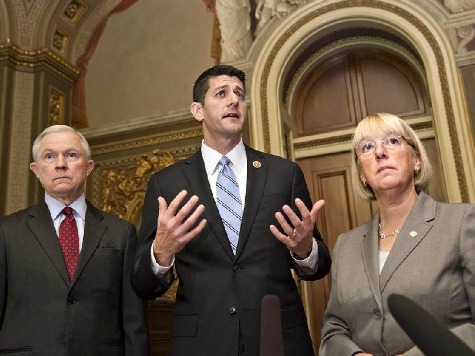
On Wednesday, Sen. Jeff Sessions (R-AL), the ranking member of the Senate Budget Committee, said he is “unable to support” the budget deal announced by Sen. Patty Murray (D-WA) and Rep. Paul Ryan (R-WI) because it is not a formal budget agreed upon by House and Senate conferees.
“This legislation is not a budget and was never formally considered, crafted, or voted upon by the conferees,” he said. “I appreciate the hard work Chairman Ryan and Chairman Murray put into their deal, but I am not able to support it.”
Saying he had “serious concerns” about the budget deal, Sessions said that the Senate and House budget resolutions that were committed to Conference “were not acted on” and “the result is legislation from Chairman Ryan and Chairman Murray, leaving Congress without a budget resolution for the fourth straight year.”
Sessions said while he favored “reorganizing elements of the Budget Control Act to smooth the impact, I do not favor increasing total discretionary spending above what was agreed to over the 10-year BCA period (exchanged for the already-exhausted $2.1 trillion debt increase in 2011).”
He specifically noted that he did not “favor using trust fund savings to increase discretionary spending” and noted that “much of the spending increase in this deal has been justified by increased fees and new revenue.”
“In other words: it’s a fee increase to fuel a spending increase–rather than reducing deficits,” he said. “Disappointingly, CBO’s analysis states that $47 billion out of the $85 billion in offsets occur outside the original BCA window, and the spending cut portion of those outyear offsets are of dubious validity. It is not disputable that net spending in the BCA window is increased.”
As Breitbart News has reported, the budget deal increases federal spending and revenue while using spending cuts to fuel more federal spending. In addition, the deal keeps America on a path to accumulating $25 trillion in debt by 2023.

COMMENTS
Please let us know if you're having issues with commenting.